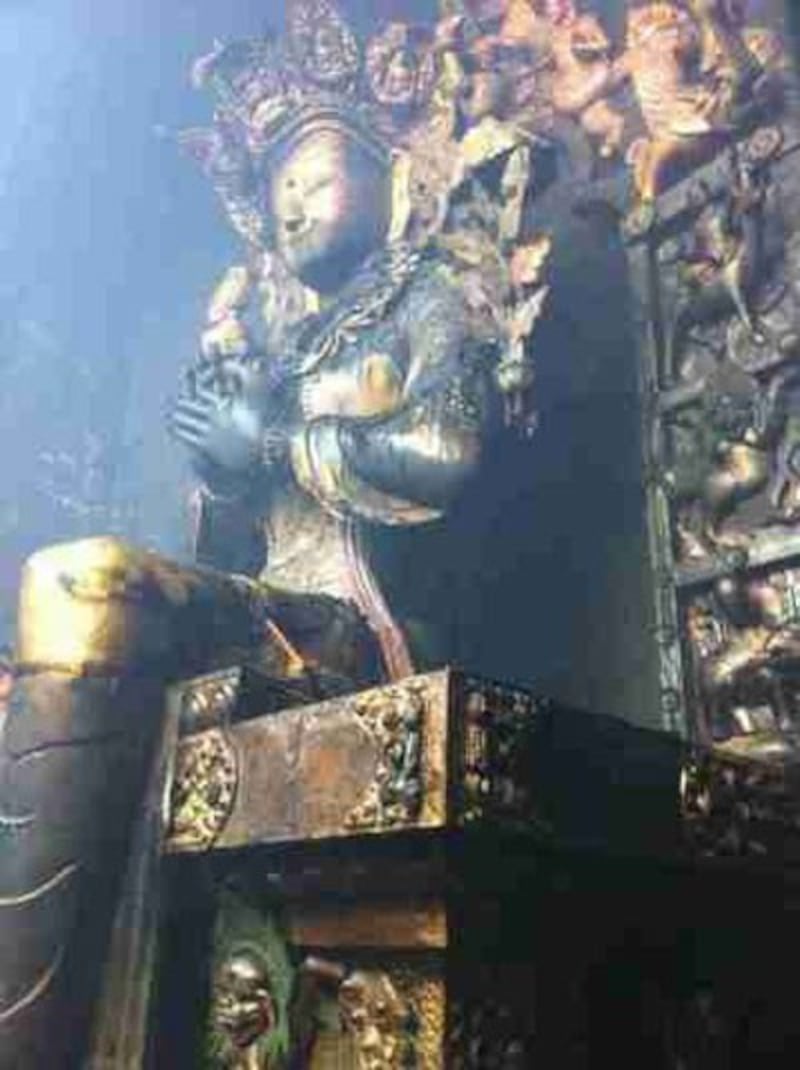Updated at 11:55 a.m. EST on 2013-11-21
Fire has caused "massive damage" to the main prayer hall of a revered 16th century monastery in a Tibetan area of China's Sichuan province, injuring at least two monks, sources said Sunday.
The cause of the blaze at the Ganden Thubchen Choekhorling monastery in Lithang (in Chinese, Litang) county in the Kardze (Ganzi) prefecture of Sichuan province late on Saturday remained unclear, a source from the area told RFA’s Tibetan Service.
"On Saturday night between 9:00 and 10:00 p.m., one of the main prayer halls in the Lithang monastery … was burnt to the ground,” the source said, speaking on condition of anonymity.
“The cause of the fire is not known, but some suspect that it was caused by a butter lamp while others suspect a short circuit.”
The Ganden Thubchen Choekhorling monastery was founded during the era of the third Dalai Lama, or Tibetan spiritual leader, in 1580.
The source said that both Tibetan and Han Chinese residents of the area worked together to extinguish the flames, but were unable to do so.
“We [Tibetans] who live near the monastery and also the Chinese who live close to by tried to put out the fire, but we had no success,” the source said.
It was unclear whether the monks who act as caretakers of the hall’s main shrine were injured during the fire, he said.
However, a Tibetan source in exile with links to the Lithang area told RFA that two monks had suffered injuries in the blaze.
“No lives were lost in the fire, but two monks were reported hurt,” the source said.
“Now the fire has died down, but the destruction [to the hall] is massive.”
A third source, also in exile, said that in addition to the main shrine, several precious artifacts inside the prayer hall had been badly damaged.
“This main shrine was built by Sonam Gyatso, the third Dalai Lama, in 1580,” the source said.
“The main statues in the shrine were also damaged and defaced by the fire and smoke.”

Monastery history
The Ganden Thubchen Choekhorling monastery is known as the birthplace of the seventh and tenth Dalai Lamas.
In 1956 the monastery came under siege and was largely destroyed by China’s People’s Liberation Army, following resistance to attempts by Beijing to impose communist rule and reforms in the area.
The monastery also suffered extensive damage at the hands of China’s Red Guards during the 1966-76 Cultural Revolution, a social-political movement that targeted historical relics and artifacts as well as cultural and religious sites for destruction.
Lithang has been the site of several public protests by Tibetans against Chinese rule.
On Aug. 1, 2007, Tibetan activist Rongyal Adrak called for Tibetan freedom and the return of the Dalai Lama from exile in India while standing on the reviewing stage of an annual horse racing festival in the county.
He was immediately detained, prompting a standoff between Chinese security forces and thousands of Tibetans who demanded his release, and was sentenced in October to eight years in prison.
Following widespread protests across Tibetan regions the following year, Rongyal Adrak’s calls for Tibetan unity and freedom have now been repeated throughout Tibet.
Sporadic demonstrations and a campaign of self-immolations have continued since 2009, with 123 Tibetans to date having set themselves ablaze to challenge Chinese rule and call for the return of the Dalai Lama.
Reported by RFA’s Tibetan Service. Translated by Karma Dorjee. Written in English by Joshua Lipes.
CORRECTION: An earlier version of this story did not give an updated number for Tibetan self-immolation protests.
